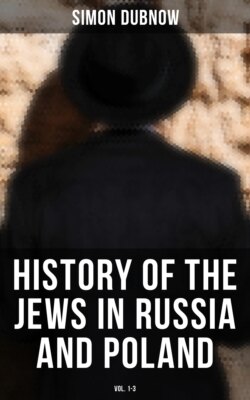Читать книгу History of the Jews in Russia and Poland (Vol. 1-3) - Dubnow Simon - Страница 25
На сайте Литреса книга снята с продажи.
4. Secular Sciences, Philosophy, Cabala, and Apologetics
ОглавлениеThe Talmudic and Rabbinic science of law, absorbing as it did the best mental energies of Polish Jewry, left but little room for the other branches of literary endeavor. Among the daring "swimmers in the Talmudic ocean," contending for mastery in erudition and dialectic skill, there were but few with deeper spiritual longings who evinced an interest in questions of philosophy and natural science. The only exceptions were the physicians, who, on account of their profession, received a secular education at the universities of that period.
Originally the Jewish physicians of Poland were natives either of Spain, whence they had been expelled in 1492, or of Italy, being in the latter case graduates of the Catholic University of Padua. Several of these foreign medical men became the body-physicians of Polish kings, such as Isaac Hispanus under John Albrecht and Alexander; Solomon Ashkenazi (who subsequently was physician and diplomat at the court of the Turkish Sultan Selim II.) under King Sigismund Augustus; Solomon Calahora under Stephen Batory, and others. But as early as the first part of the sixteenth century these foreigners were rivaled by native Jewish physicians, who traveled from Poland to Padua for the special purpose of receiving a medical training. Such was, for example, the case in 1530 with Moses Fishel, of Cracow, who was at once rabbi and physician. These trips to Italy became very frequent in the second part of the sixteenth century, and the number of Polish Jewish students in Padua was on the increase down to the eighteenth century. It is characteristic that the Christian Poles studying in Padua refused to enter their Jewish compatriots upon their "national register," in order, as is stated in their statutes, "not to mar the memory of so many celebrated men by the name of an infidel" (1654). In the university registers the Jewish students appeared as Hebraei Poloni.
As for religious philosophy, which was then on the wane in Western Europe, it formed in Poland merely the object of amateurish exercises on the part of several representatives of Rabbinic learning. Moses Isserles and Mordecai Jaffe commented, as was pointed out above, on the "Guide" of Maimonides in a superficial manner, fighting shy of its inconvenient rationalistic deductions. The favorite book of the theologians of that period was Ikkarim ("Principles"), the system of dogmatic Judaism formulated by the conservative Sephardic thinker Joseph Albo. Commentaries to this book were written by Jacob Koppelman, of Brest-Kuyavsk105 (Ohel Ya`kob, "Tent of Jacob,"106 Cracow, 1599), and Gedaliah Lifshitz, of Lublin (Etz Shathul, "Planted Tree,"107 1618). The former, a lover of mathematics, loaded his commentary with geometrical and astronomical arguments, being of the opinion that it was possible in this way to prove scientifically the existence of God and the correlation of all phenomena. The latter was more inclined towards metaphysics and morals. How far this commentator was from grasping the true meaning of the original may be seen from his annotations to the introductory theses of the book. Commenting on the passage in which Albo states that "the happiness of man depends on the perfection of his thought and conduct," Lifshitz makes the following observation: "By human happiness is understood the life beyond the grave, for the goal of man in this world consists only in the attainment of eternal bliss after death."
In this way the Polish rabbis fashioned philosophy after their own pattern, and thereby rendered it "harmless." Free research was impossible, and perhaps not unattended by danger in an environment where tradition reigned supreme. The Chief Rabbi of Cracow, the above-mentioned Joel Sirkis, expressed the view that philosophy was the mother of all heresies, and that it was the "harlot" of which the wise king had said, "None that go unto her return again" (Proverbs ii. 19). He who becomes infatuated with philosophy and neglects the secret wisdom of the Cabala is liable, in Sirkis' opinion, to excommunication, and has no place among the faithful. The well-known mathematician and philosopher Joseph Solomon Delmedigo (called in abbreviated form "YaSHaR of Candia"108) who spent nearly four years in Poland and Lithuania (1620–1624), arraigns the Polish Jews for their opposition to the secular sciences:
